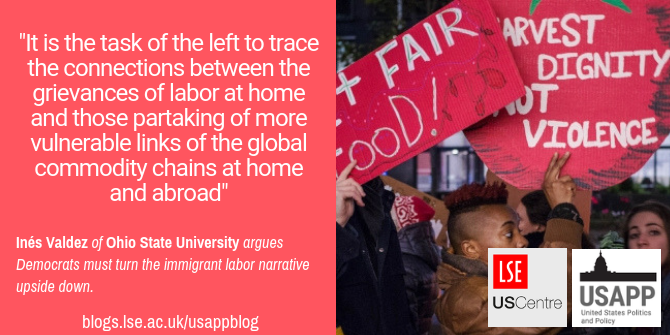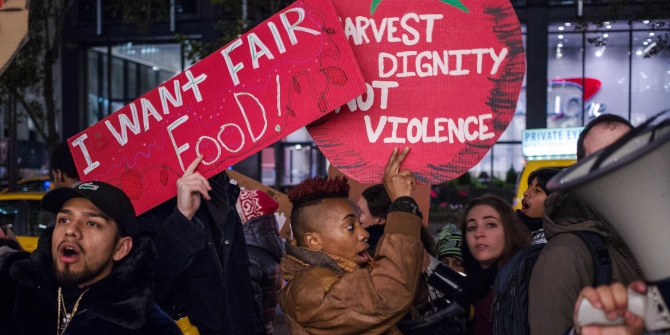 The immigration debate in America has become divided between positions which highlight the threat of immigration to the economy and national security on one side and the other which emphasizes humanitarianism and human rights. With each side aligned with the Republican and Democratic parties, respectively, the left tends to avoid engaging with economic questions for fear of alienating low-skilled workers. But as Inés Valdez argues, employers and the state, not migrants, have the biggest role to play in setting wages and controlling labor demand, meaning that there is an opening for the left to advocate for immigration from an economic perspective.
The immigration debate in America has become divided between positions which highlight the threat of immigration to the economy and national security on one side and the other which emphasizes humanitarianism and human rights. With each side aligned with the Republican and Democratic parties, respectively, the left tends to avoid engaging with economic questions for fear of alienating low-skilled workers. But as Inés Valdez argues, employers and the state, not migrants, have the biggest role to play in setting wages and controlling labor demand, meaning that there is an opening for the left to advocate for immigration from an economic perspective.
A recent little-noted court decision on immigration powerfully brings home some core limitations of the current immigration debate in the United States. On Monday March 18, the US District Court for the District of Columbia denied a request by onion growers Peri & Sons Farms Inc. to freely set guest worker wages below minimum mandated levels. The rule in question, the Adverse Effects Wage Rates (AEWR) was first introduced during the Bracero Program and prevents employers from artificially depressing wages in agriculture. The Bracero Program prevents growers from setting wages for foreign laborers below federal or state minimum wages or the local or regional prevailing wages, whichever is highest. This floor is still low, but without AEWR employers would enjoy even greater leeway to strategically choose workers in order to pay the lowest possible wage, and eventually reduce wages in the sector overall. Acknowledging these effects requires facing important dynamics of labor allocation and labor control—which take place in the realm of immigration, among others—that need to be addressed by the left.
Immediate and broader implications follow from this case. First, politicians who complain about the depressing effect of migrant labor over domestic wages have a straightforward tool to prevent this: raise minimum wages or alter the formula to calculate the AEWR (which the Bush administration did, lowering hourly wages by $1 to $2 per hour, a change that the Obama administration reversed). Second, this case and the contested program tell us not that immigrants depress wages for American workers—a favorite line of anti-immigrant forces—but that employers—when left to their own devices—will aim to do just that. In other words, employers and the state hold the power to determine wages, not immigrants.
The absence of critiques of these dynamics from the left on the public debate on immigration reveals the success of the conservative narrative of labor competition that redirects blame toward migrants and stokes hostility against them. Instead of engaging with the political economy of migration, the left has predominantly relied on narratives of humanitarianism and human rights to advocate for immigrants. This includes the recently introduced Dream and Promise Act (HR6), which provides relief and access to status to two groups typically targeted for humanitarian concern: migrants who arrived to the United States as children and natives of countries affected by armed conflict or natural disasters. This misses that the left could successfully both make a case for American workers and recognize the economy-wide decrease in jobs with a living wage without adopting an anti-immigrant stance. The key to this strategy is contained in Bush’s measure: by the stroke of a pen, Bush provided a windfall gain to agricultural growers, who got to appropriate millions of dollars that would have gone to wages of migrants and domestic farmworkers. This was not a gain for migrants at the expense of US workers; it was a gain for agricultural employers at the expense of both of those groups. Vibrant grassroots movements are already traveling this path. The “Fight for Fifteen” movement promotes the organization workers in the United States and abroad to demand that local government set a living wage. Such a wage would lift all workers, regardless of immigration status. The Coalition of Immokalee Workers, on the other hand, organizes farmworkers to demand food corporations to purchase from growers who abide by a worker driven social responsibility model and to pay a bonus to be transferred directly to the farmworkers.

“4N3A3961” by Working Families Party is licensed under CC BY NC 2.0
But while these movements bring together US and immigrant workers, and highlight the common grievances of low paid workers everywhere, the same myopic narrative of labor competition drives populist critiques of free trade and corporations for taking “American jobs” abroad. The United States is a major international player and could actively work within the World Trade Organization to make labor conditions and wages a priority. While commentators are keen to note that workers in China and other developing countries benefit by the meager, but comparatively higher, wages offered by Western corporations setting up or subcontracting from assembly plants, it would be surprising if these workers were opposed to receiving higher wages and better working conditions, which could result from serious regulation of these matters at the international level. If this sounds like a pipe dream, it is because we have been trained to believe that efforts to regulate global markets for finance and goods are doomed by the very dynamism and inevitability of these flows. Yet, the intricate system of international investment and trade law devoted to protect corporate actors reveals that these sectors are confident in the effectiveness of regulations and enthusiastic about them, as long as they are in place to protect their interests.
It is important to note that—important as this is—raising tax rates at the domestic level does not address these problems. Even if taxes would fund widespread redistributive schemes that would benefit US workers or provide them with accessible public services, the dynamics that allow employers to exploit workers by shifting jobs between domestic and foreign workers, would remain unchecked and perhaps even worsened by improved domestic standards. Similarly unchecked would be the power of corporations enabled by domestic and international regulations to do so. More problematically, just as W. E. B. Du Bois lamented a century ago, such taxation would involve appropriating wealth attained globally for the benefit of a sub-group of enfranchised Western citizens.
It is time for the left to reclaim global economic dynamics—including those of migration—as a subject of critique. Center left governments lost this opportunity with their widespread embrace of globalism in the recent past but it can be recovered. This recovery, however, cannot be solely about protecting workers at home, as some commentators and left politicians are wont to do, for it shortsightedly aims to solve a global problem by sheltering an already privileged sub-group. This is an important point for proponents of the Green New Deal, which should not fall on the trappings of the first New Deal, with its racially exclusionary features and its disregard of foreign domination by the United States. A commitment to workers is a commitment to keeping employers and corporations’ power under check.
The populist discourse that blames globalization for taking “American jobs” pits US workers against a fuzzy group of impoverished foreign workers willing to do the job for less, rather than directing our sights to the freedom that international trade and investment regimes have given US corporations to increase its profits through exploitative labor conditions. Similarly, the right’s insistence on immigration restrictions is a call to produce ever more vulnerable working conditions for immigrant workers, particularly those without papers, in a way that empowers employers through and through. The response of the left on immigration has focused on humanitarianism a necessary stance because of the vast reach of the immigration enforcement regime and the concomitant production of vulnerable groups. But this response does not tackle that economic exploitation is at the core of the immigration question and the global order.
The trope of labor competition has been successful beyond anyone’s dreams and was openly at play in the xenophobia and anti-globalism that propelled Trump to the White House and Britain into Brexit in 2016. It is the task of the left to counter this story: to trace the connections between the grievances of labor at home and those partaking of more vulnerable links of the global commodity chains at home and abroad: a common subjugation under unchecked corporate power.
Please read our comments policy before commenting
Note: This article gives the views of the author, and not the position of USAPP– American Politics and Policy, nor of the London School of Economics.
Shortened URL for this post: http://bit.ly/2FXDRxi
About the author
 Inés Valdez – Ohio State University
Inés Valdez – Ohio State University
Inés Valdez is a political theorist and an assistant professor in the Department of Political Science at the Ohio State University. She is currently a Humboldt Stiftung Fellow at the Hanse-Wissenschaftskolleg in Delmenhorst (Germany). Her book Transnational Cosmopolitanism: Kant, Du Bois, and Justice as a Political Craft will be published by Cambridge University Press in May of 2019.




